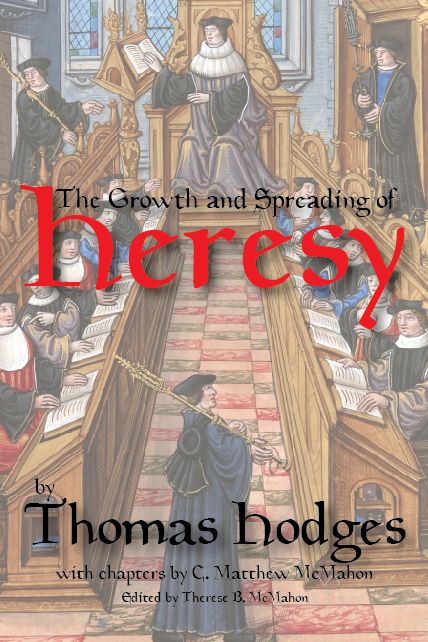Thomas Hodges (1600-1672)
A Calvinistic English Puritan, covenanter, and member of the Westminster Assembly.His Works are:
The works of Thomas Hodges are currently being updated and published by Puritan Publications.
1. A Glimpse of God’s Glory: as it was presented in a sermon from Psalm 113:5-6. Preached…before the hon. House of Commons, at the late solemne fast, 28th Sept. 1642. 4to. pp. 41. London, 1642.
2. The Growth and Spreading of Haeresie: set forth in a Sermon from 2 Pet. 2:2. preached before the Honourable House of Commons, March 10 [1647] being the day of their publike fast and humiliation for the growth of haeresie. 4to. pp. 60. London, 1647.
3. Inaccessible Glory, or, the impossibility of seeing God’s Face whilst we are in the body;…a sermon from Exod. 33:20… at the funeral of Sir Theod. de Mayerne, in the church of St. Martin in the Fields, on the 30th of March , 1655. 4to. London, 1655.
4. Sions Hallelujah: set forth in a sermon on Ps. 126:20 before the rt. hon. House of Peers…on Thursday, June 24, being the day of publick thanksgiving to Almighty God for his Majesties safe return. 4to. London, 1660.
5. A Sermon on Gen. 1:31.
6. The Hoary Head Crowned, 1652
7. A Cordial Against the Fear of Death, 1659
Biography of Thomas Hodges (1600-1672):
Thomas Hodges (1600-1672) was Minister of the Gospel at Kensington, in the county of Middlesex, near London, several years. He was at Kensington when he was chosen to be a member of the Assembly of Divines at Westminster. He took his seat in that Assembly, and gave constant attendance during the session. He was a Covenanter, and preached sometimes before the Parliament. Some sermons which he preached before the Parliament were then printed, and are still extant. In a sermon which he preached before the Honourable House of Commons, from 2 Pet. 1:2. and in his epistle dedicatory, which is prefixed to that sermon, he complains very much of the growth and spreading of heresy, and of the fruitfulness of the press in producing many monstrous misshapen births. He says, in his address to the learned and brave patriots, ” Is it not time to cry to you for help? There is nothing more excellent than God’s truth, nor of more concernment than man’s soul; both lie a-bleeding” Mr Hodges maintained, as our reformers did, in general that the care and reformation of religion belong, to civil rulers, and constituted one of the principal duties of their office. Accordingly, he farther adds, in the above-mentioned sermon, in addressing the House of Commons, “I beseech you shew mercy to lovely Truth, that beam of glory, daughter of heaven, that clue of mercy let down into this dark erring world, to lead us through the many labyrinths of a benighted mind, eiring thoughts, misleading examples, amid dark temptations, to bliss and happiness. For she suffers, and is here like to parish from us, and be utterly lost, or at least shrewdly eclipsed, if you relieve her not.” What have we to leave posterity, so precious as this Way of Truth? If that be gone, the glory is departed from Israel, and farewell all. Have we received it from our ancestors in lustre and parity, and is it not grievous to us, that in our time rt should be so mangled and defaced, that our children after us, except it be timely prevented, will scarcely beable to distinguish between it and error? Why did the valiant Martyrs shed their precious blood, but to maintain this way of truth? And shall we lose and let it go at so cheap a rate, and not mourn for it? The Jews of old, when they heard blasphemy, used to rend their cloaths, to testify the inward rending of their hearts: Can ours be whole when the foolish people so much defame God’s truth, and blaspheme his name ?” He concludes his sermon, with recommending to the learned auditory, to encourage catechising, whereby poor souls may be taught the principles of religion in the plainest manner, and that there might be milk for babes.—To plant a learned and able Ministry in every eminent place. And here, he says, ” Give me leave to suggest unto you, That there are many learned men in this kingdom, whom God hath not gifted with elocution and other the like abilities for pulpit-work, yet would be very fit to maintain the Truth by their pen, against destroying errors, might they but have encouragement.” He adds, “Settle with all convenient speed your Confession of Faith, wherein people may take notice what is allowed for Truth, upon mature debate;—and with little pains discern what is right or wrong.” And that error might be effectually suppressed, and truth established, he advises the worthy senators, as the guardians and foster-fathers of Truth, to take special care of the Universities, that learning and piety be sufficiently encouraged in these useful fountains. And that reading the Holy Scriptures, and pious exercises, might be more in use among them. Wood says, that after his Majesty’s restoration, Mr. Hodges became rector of St Piter’s church in Cornhill. London, and dean of Hereford in the place ot Dr. H Croft who was made bishop thereof in 1661; and that holding that deanery to the time of his death, he was succeeded therein by Dr. George Benson about Mid-summer, in the year 1672.






